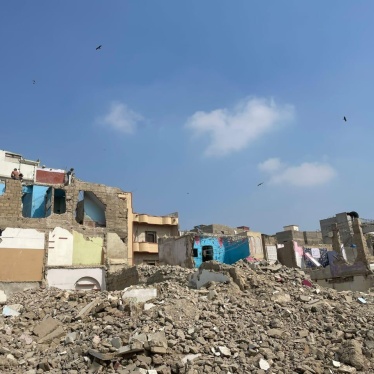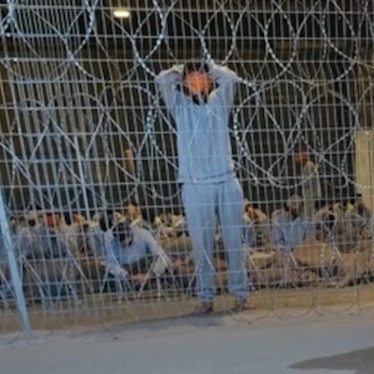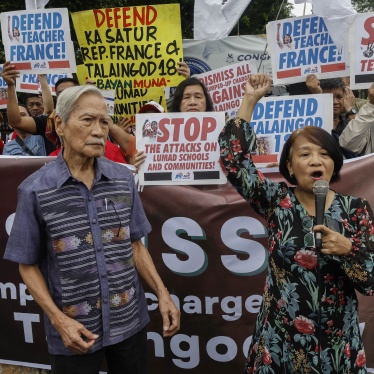Question: What is Human Rights Watch's assessment
of the State Peace and Development Council's [SPDC's] response to Cyclone Nargis?
Answer: The initial response was disgraceful; it is still shocking to me that the military government obstructed the relief effort in the first weeks after the cyclone. How many people suffered or even died due to this obstruction?
The SPDC's reaction was proof-clear proof-as if any more was needed, of the complete disdain the military leadership has for its own people.
There was a huge amount of genuine goodwill in the international community to provide aid and skilled aid workers to help. But this was delayed and delayed and, in large measure, blocked. Even now the movements of many foreign aid workers remain tightly controlled. To think of the aid shipments on US, French and British warships waiting offshore that were rejected is heartbreaking. This was largely due to the SPDC's paranoia. Even when things got better, as they belatedly did, the military still placed their own selfish and paranoid security interests first.
The 2.4 million people affected in the Irrawaddy delta deserve more. This situation should still be a matter of urgent concern for the international community as many people still haven't received any help and those who are counted as having received help have not received enough. All of this is the responsibility of the SPDC.
Q: How do you assess the role of the international community and its aid agencies in Burma?
A: As the government has long ago abdicated its responsibility for the welfare of the Burmese people, international donors and agencies have a critical role to play inside Burma and should be supported.
But we must also understand the challenges they face. These agencies are assisting communities devastated by the cyclone, but they are working in a country where they also have to address alarming poverty and dire health and welfare problems because of failed governance. Human Rights Watch has long supported increased humanitarian assistance to Burma, but aid going into Burma must be provided in an accountable, transparent and principled manner. It must reach the people who desperately need it, not the generals and their favored businessmen. Restrictions on aid agencies and workers should be removed and more freedom of movement, monitoring and effective projects provided.
One thing the international community can do is provide more aid across borders to conflict zones where the situation is often most desperate. It would also train more eyes on what is happening in these areas and undermine the SPDC, which doesn't want the international community to witness systematic human rights violations in these remote areas.
Q: There was a lot of talk during the past three months on invoking the "Responsibility to Protect" principle, especially by [International Crisis Group President] Gareth Evans and [French Foreign Minister] Bernard Kouchner. How applicable do you think it would be in Burma? And do you think there are crimes against humanity being perpetrated in Burma?
A: There was a lot of talk about R2P [Responsibility to Protect] at the time, which reflected the frustration of many in the international community. France was courageous to raise this. We did not take a position on it, as R2P is based on genocide, war crimes, crimes against humanity or ethnic cleansing, and we did not have clear evidence of this.
However, we agreed with the main point of the French, which was that the world could not stand by and watch large numbers of people die or suffer because of the malice of a government. We called for concrete action by the UN Security Council and Burma's friends, such as China, India and Thailand. What was really frustrating was the international discord over the R2P principles and the idea of international collective action to help people, which served as a diversion by those who didn't want any action at all, whatever the label. China and other states refused to support stronger diplomatic measures to open up humanitarian space inside Burma, just as they have failed to push the military government more on its atrocious human rights record.
Clearly the actions of the senior Burmese leadership have contributed to violations of international humanitarian law in conflict zones, and these include crimes against humanity. Human Rights Watch has documented this for years and we have called for an international commission of inquiry to look into this and make recommendations for action.
Q: Do you see any possibilities to bring Snr-Gen Than Shwe before the International Criminal Court?
A: It's something that the international community must look at, but it's complicated both legally and politically. As with the idea of crimes against humanity charges, it is a long process that will take a huge amount of resources. The challenge is to collect the right evidence and understand the process of bringing such charges to the ICC [International Criminal Court].
Q: What are some of the provisions international donors should employ on providing aid and reconstruction finance to Burma?
A: In our recent letter to aid donors we listed 10 key provisions, which included the urgent need of communities to receive aid; unimpeded humanitarian access for local Burmese and international aid organizations to affected areas; that funding should go through aid organizations and not the Burmese military government; that reconstruction efforts should be closely monitored so that human rights violations such as forced labor, forced evictions and land seizures don't occur; and that there be no discrimination on aid delivery on religious or ethnic grounds.
We also asked the international community to pressure the SPDC into using some of its gas export revenue to fund reconstruction and ensure that no contracts are awarded to individuals on current international sanctions lists.
Given the great concern over the SPDC's abuse of aid in the past, we proposed an independent monitoring body be created to ensure aid is delivered appropriately and based on real need. We're waiting for action on that.
Q: What examples of human rights violations tied to the referendum has your organization documented?
A: Well, the [referendum] was a sham, made even more insulting by the fact that it was pushed through during the desperate aftermath of the cyclone.
The biggest clue was the refusal of the SPDC to receive UN technical assistance or permit independent observers. That's a red flag right there. The most immediate concern was the climate of fear in the country, as many people realized the consequences of openly opposing the referendum, especially as they could have been sent to jail for three years under the absurd referendum law.
The idea of a free and fair vote under military rule is a nonstarter and the regime seemed intent on proving this with their ridiculous turnout and vote counts. There is a raft of repressive laws in Burma that sharply curb freedom of expression, assembly and association. Before the referendum we documented cases of intimidation against people during the registration process, and there were a lot of irregularities over how people were registered and what they knew about the whole process, which wasn't a lot.
There was a lot of intimidation of the media, which was not allowed to report freely and openly on the process. Monks and other members of religious orders were not given the vote-hardly surprising, following the monks' involvement in last year's popular protests. Out of this tightly orchestrated farce it's no wonder that a 92 percent approval was announced by the SPDC.
Q: In what ways does the organization of the referendum breach international standards for elections?
A: There was no independent election body, no independent courts to adjudicate disputes, no ability to challenge results, no free media- you name it.
By any international standards the referendum failed miserably, but by SPDC standards it all went according to plan.
Q: How do you foresee the junta's election in 2010 and its aftermath in view of the fact that its constitutional referendum in May wasn't seen as "free and fair"?
A: There is no reason to believe or even hope that the vote in 2010 will be free and fair. The point of the election is to put a civilian face on a military regime by handpicking the winners. This is likely to be the USDA or a similar group.
There must be a major conceptual shift to empower people, not continue to subordinate them. Releasing political prisoners and permitting basic freedoms, such as political party mobilization, freedom of information, freedom of assembly, freedom of expression-these are all fundamental prerequisites to a democratic process, but these are the elements the SPDC is suppressing.
And they call it "disciplined democracy." What does that mean? It's an Orwellian affront to human freedom. So, in short, no, I don't foresee much hope for the 2010 elections at the moment.
Q: It could be said that the international community has forgotten about Daw Aung San Suu Kyi, who remains under house arrest and has been excluded from this process. What does Human Rights Watch think the role of Daw Suu Kyi in this process should be?
A: The first step should be her unconditional release from house arrest, clear and simple.
The SPDC has worked very hard to construct the idea that Aung San Suu Kyi is irrelevant to modern Burma and that she is in some ways the cause of the political impasse. It is impossible to stomach this argument, even as some foreign observers perpetuate it. How can someone who has consistently called for peaceful dialogue on the political future of the country be blamed for its problems, especially when she has spent most of her time since 1989 in state detention?
If she is irrelevant, then why is she still isolated, vilified and excluded? Maybe it's because she still has some relevance to the people of Burma, a point the military regime obviously understands-or else why would they still take the cowardly route of isolating her?
As to her role in the future affairs of Burma, that has to be something the Burmese people themselves figure out.
Q: In a previous interview with The Irrawaddy you talked about the rights of Burma's ethnic minorities. How have they been treated in this process?
A: As appallingly as ever, particularly those hundreds of thousands of people still surviving in remote conflict zones who have been violently excluded from the whole process. While there has been participation by some ethnic ceasefire groups in the National Convention, particularly the Wa and Kachin, many others have been brutally treated, such as the leaders of the Shan political party who were all thrown in jail in 2005. Other groups have distanced themselves from the process, such as the Mon, due to disappointment over the process. Others have tried to participate to ensure their legal status.
Ethnic groups have still not benefited sufficiently from the so-called peace process in the country, and while many have been making headway in local development projects, they need to be more involved in deciding their future and that of the country. Otherwise the resentment against the central government will continue and the possibility of a renewed descent into violence would be real.
Q: How would you assess the diplomatic role of the international community on Burma, particularly the UN secretary-general's special advisor Ibrahim Gambari?
A: The role of the international community is crucial; it always has been. However, there is a desperate need for more unified action among the main international players. China, India, Russia and Thailand need to stop defending the regime and push for real change and protection of basic rights. The SPDC benefits greatly from their moral, political and financial support, and feeds off international discord.
The role of Professor Gambari could be very important but, as the "Group of Friends" of Burma said at its most recent meeting, his next visit must make "tangible progress."
Thus far the SPDC has been playing games with Gambari, just as they did with Razali when he held the same role. Gambari has to be supported, but there must be some progress, not more visits with little or nothing to show for it.
At this point the regime has given nothing important to Gambari since he took up his post. He must come away from his next visit with something real, including a clear picture of what the SPDC plans next on political reforms, and a list of promises they can keep.
Q: The new UN Special Rapporteur for Human Rights in Burma, Thomas Ojea Quintana, has a challenging task. What are some of the areas he should prioritize for Burma's human rights situation?
A: The question isn't really what his priorities are-you name the subject and there exists in Burma a serious human rights problem that he can pursue. The question is how the SPDC is going to cooperate with him. We have to remember that they have treated successive envoys with disdain since the early 1990s. They even planted a microphone under a table during a supposedly confidential interview between Paulo Pinheiro and a prisoner at Insein prison in 2003. They need to let Mr Quintana operate freely so that he can meet people and document the situation on the ground. We hope for the best, but expect the worst, even if they are being relatively friendly with him early on in his mandate.
Q: It has been nearly a year since the crackdown on protests in Burma during August-September 2007. How is the human rights situation in the country now?
A: Unfortunately the situation is as bad as it was before the demonstrations began in August. There has been no progress on human rights or democratization at all.
The SPDC have simply ignored the concerns of the Burmese people. Most of the people arrested during the protests, including Min Ko Naing and other members of the 88 Generation Students, and the labor activist Ma Su Su Nway, are still in prison. Of course they and all other political prisoners should be released immediately. The famous comedian Zarganar, who was arrested briefly during the protests last year, was arrested a couple of months ago for organizing aid delivery to cyclone-affected communities, and he was recently sentenced to two years in jail for that.
The monks' movement is still active, if underground, and the pressure on the monasteries has been maintained, which has undercut the social services they provide to communities. The essential grievances of people-better living standards, access to health services, job opportunities, and some sense of hope-have been ignored by the government.
Q: It seems that the SPDC is impervious to international pressure. How effective does your organization think sanctions could be in this situation?
A: Sanctions can be effective if they are the right ones that target the right individuals and institutions.
Recent targeted financial and other sanctions announced by the US, the EU and Australia have the possibility of being meaningful if there is real political will and constant monitoring to make them effective. Sanctions on Burma should target key military leaders and their business associates who benefit from military rule, and a handful of sectors that strengthen military rule.
Targeted sanctions should be seen as a tool of principled engagement with the SPDC-not an isolationist policy.





